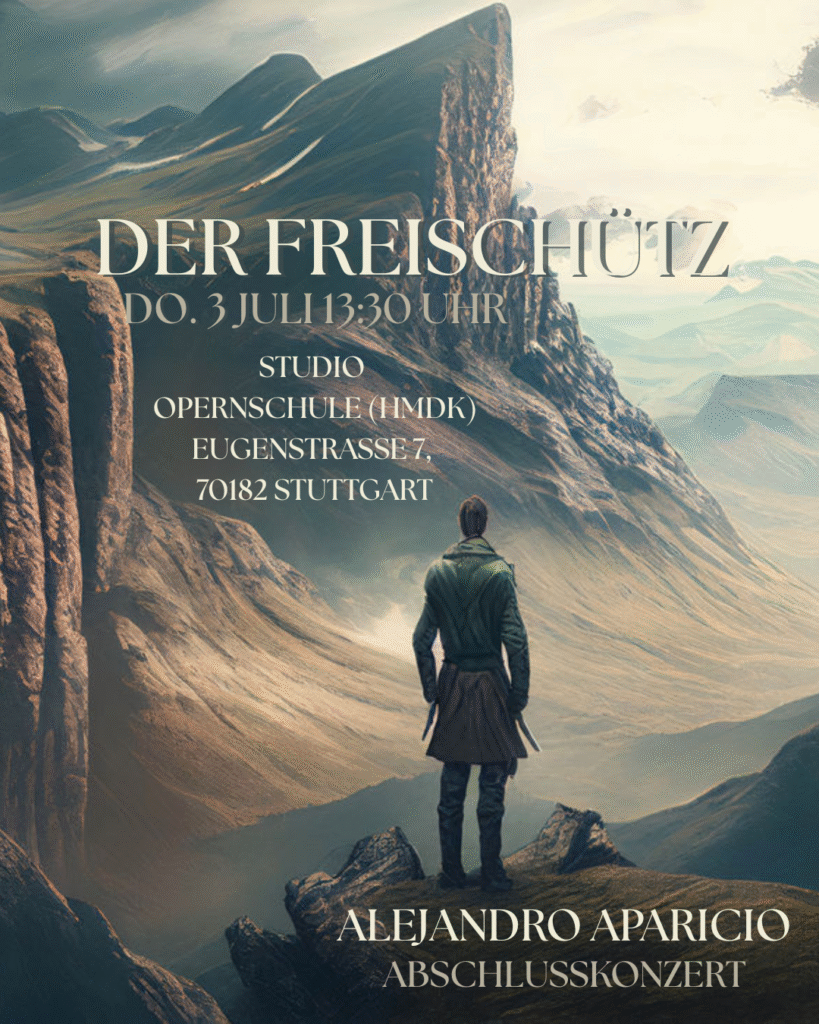MAX
The rol of Max from «Der Freischütz», composed by Carl Maria von Weber, will be performed at the Studio of the Opernschule in the Hoschule für Musik und Darstellende Kunst (HMDK) in Stuttgart the 3rd of july of 2025 at 13:30h as the Final Performance of my Oper Master

ROLE INFORMATION
NAME: Max
AGE: Young man
PROFESSION/STUDIES: Ranger on practice
FAMILY: Orphan, Kuno (adoptive father)
FRIENDS: Kaspar? Killian?
LOVE: Agathe
PHYSICAL DESCRIPTION: an athletic person from so much training in the forest, very good eyesight and hearing. He used to wear a ranger uniform
PSYCHOLOGICAL DESCRIPTION: was a very self-confident person and very confident in his skills as a ranger and as a hunter. A few weeks ago, his insecurity began to grow because he was not achieving absolutely nothing, he set out to do. He is a young man of deep faith who usually entrusts himself to God
HOBBIES: hunting, drinking, playing cards
FAVORS: a deep faith in God and an omnipotent love for Agathe
DEFECTS: a growing insecurity that drives him to do things he have never done before
PERSONAL ITEMS: shotgun, hunting jacket
WHAT IF
What would happen if we brought the well-known story of Der Freischütz closer to the present?
What if Max were a student ranger trainee?
What if the shooting competition was simply part of a German spring fair?
What if we only wanted to tell the story from Max’s point of view?
This reinvention of the classic will only feature Max’s vision. Max is the only character on stage and tells his own story using other characters in the distance but following his own steps from the Fair to the Wolfsschlucht and back.
It shows a much more natural Max who even talks to himself and has his doubts about what to do and how. The character embodies self-doubt, despair and faces his own fears in a version without scenery beyond an empty stage.
SYNOPSIS
«Der Freischütz»
Max is one of the central characters in Carl Maria von Weber’s opera Der Freischütz (The Marksman), which premiered in 1821. This opera is widely considered a landmark work in the German Romantic operatic tradition. Max’s role is both dramatically and musically pivotal, embodying themes of fear, ambition, love, and the supernatural.
Here’s an in-depth breakdown of Max’s role:
Character Overview: Max
Voice Type: Tenor
Profession: A forester or marksman (Jäger)
Motivation: Win a shooting contest to gain the hand of Agathe, his beloved, and prove himself to his peers and community.
Internal Conflict: Deep insecurity about his shooting skills, susceptibility to temptation, and fear of failure.
Role in the Plot
Act 1:
Max is introduced as a young forester who is in love with Agathe, the daughter of the head forester, Kuno.
A traditional test of marksmanship will determine whether Max is worth to marry Agathe and succeed Kuno.
Max has recently had terrible luck with his shooting and is mocked by others.
In desperation, he is persuaded by the dark hunter Kaspar to use magic bullets, supposedly guaranteed to hit their target.
Act 2:
Max agrees to go with Kaspar to the Wolf’s Glen, a haunted place where magical bullets can be cast with the help of the demon Samiel.
This is the opera’s darkest scene: eerie, supernatural, filled with Romantic gothic elements. Max is terrified but follows through.
Seven bullets are cast—six will go where Max aims, but the seventh belongs to Samiel, who can direct it at will.
Act 3:
At the shooting trial, Max successfully hits every target—until the final shot.
He fires the seventh bullet, which Samiel has aimed at Agathe.
Miraculously, she survives due to divine intervention (in some versions, a hermit’s prayer protects her).
The plot is revealed, and Kaspar dies, having sold his soul to the devil. Max confesses everything.
Max is ultimately forgiven, but he must undergo a year of probation before he can marry Agathe.
Vocal Highlights
“Durch die Wälder, durch die Auen”: Max’s big aria in Act 1. He reflects on his past success and current failure, blending lyrical introspection with dramatic tension. A showpiece for tenors with both lyrical and heroic qualities.
Ensemble work: Max has duets with Agathe, scenes with Kaspar, and sings in the large Wolf’s Glen sequence.
Themes Embodied by Max
Romantic Hero: Torn between good and evil, reason and emotion, nature and the supernatural.
Moral Fallibility: He chooses to take a shortcut via dark forces, but ultimately repents.
Human Frailty vs. Divine Mercy: His redemption arc shows that even flawed characters can be forgiven through humility and love.
Symbolism
Max’s journey reflects a broader Romantic theme: man’s struggle with nature and the unknown.
The magic bullets symbolize the illusion of control, temptation, and the price of power.
Max’s fear of inadequacy drives him to the brink, showing how personal insecurity can open the door to darker influences.
Fun Fact
“Der Freischütz” was a huge influence on Wagner and later German opera, especially with its integration of folklore, nationalism, and the supernatural. Max is often compared to Wagner’s heroes like Lohengrin or Siegmund, precursors to the troubled, noble-tenor archetype.